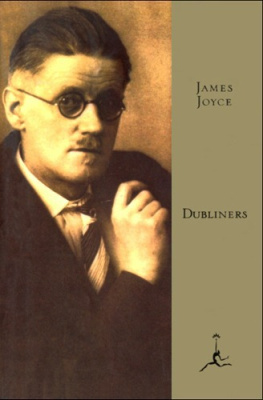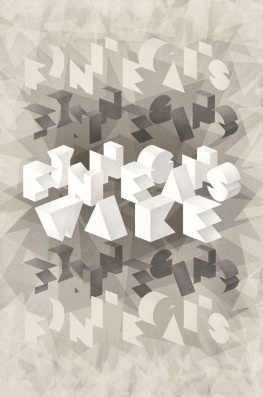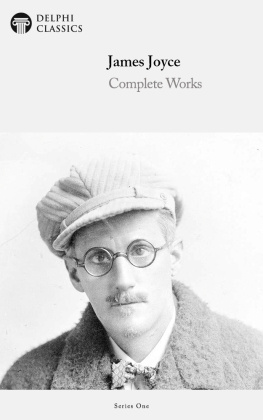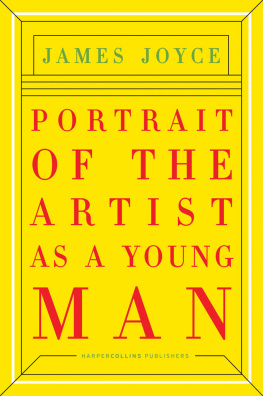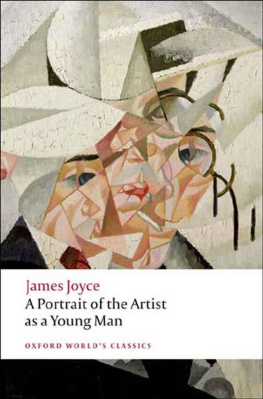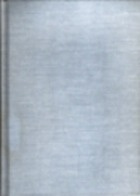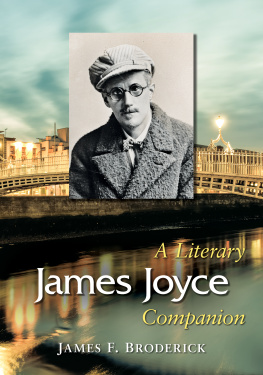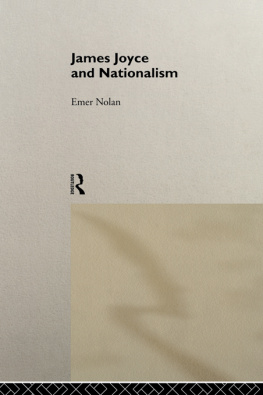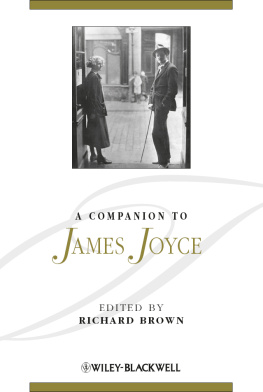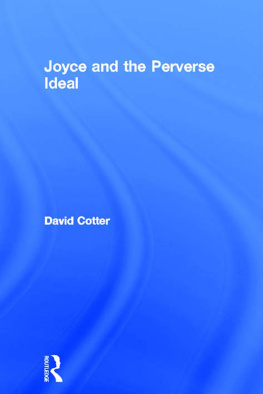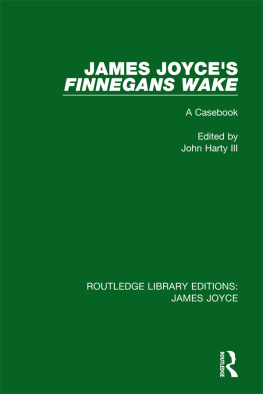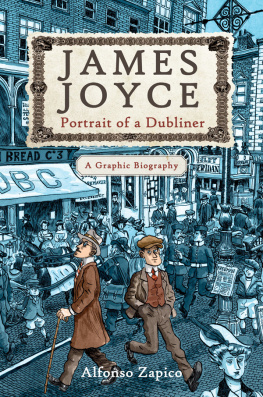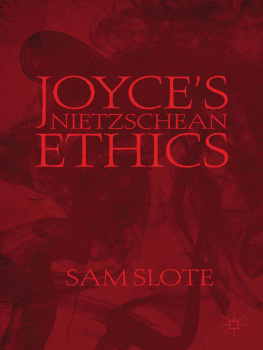James Joyce - Dubliners (Modern Library)
Here you can read online James Joyce - Dubliners (Modern Library) full text of the book (entire story) in english for free. Download pdf and epub, get meaning, cover and reviews about this ebook. year: 1993, publisher: Modern Library, genre: Art. Description of the work, (preface) as well as reviews are available. Best literature library LitArk.com created for fans of good reading and offers a wide selection of genres:
Romance novel
Science fiction
Adventure
Detective
Science
History
Home and family
Prose
Art
Politics
Computer
Non-fiction
Religion
Business
Children
Humor
Choose a favorite category and find really read worthwhile books. Enjoy immersion in the world of imagination, feel the emotions of the characters or learn something new for yourself, make an fascinating discovery.
- Book:Dubliners (Modern Library)
- Author:
- Publisher:Modern Library
- Genre:
- Year:1993
- Rating:3 / 5
- Favourites:Add to favourites
- Your mark:
- 60
- 1
- 2
- 3
- 4
- 5
Dubliners (Modern Library): summary, description and annotation
We offer to read an annotation, description, summary or preface (depends on what the author of the book "Dubliners (Modern Library)" wrote himself). If you haven't found the necessary information about the book — write in the comments, we will try to find it.
Dubliners (Modern Library) — read online for free the complete book (whole text) full work
Below is the text of the book, divided by pages. System saving the place of the last page read, allows you to conveniently read the book "Dubliners (Modern Library)" online for free, without having to search again every time where you left off. Put a bookmark, and you can go to the page where you finished reading at any time.
Font size:
Interval:
Bookmark:
By James Joyce
THEREwas no hope for him this time: it was the third stroke. Night after night I hadpassed the house (it was vacation time) and studied the lighted square of window:and night after night I had found it lighted in the same way, faintly andevenly. If he was dead, I thought, I would see the reflection of candles on thedarkened blind for I knew that two candles must be set at the head of a corpse.He had often said to me: "I am not long for this world," and I hadthought his words idle. Now I knew they were true. Every night as I gazed up atthe window I said softly to myself the word paralysis. It had always soundedstrangely in my ears, like the word gnomon in the Euclid and the word simony inthe Catechism. But now it sounded to me like the name of some maleficent andsinful being. It filled me with fear, and yet I longed to be nearer to it andto look upon its deadly work.
OldCotter was sitting at the fire, smoking, when I came downstairs to supper.While my aunt was ladling out my stirabout he said, as if returning to someformer remark of his:
"No,I wouldn't say he was exactly... but there was something queer... there wassomething uncanny about him. I'll tell you my opinion...."
Hebegan to puff at his pipe, no doubt arranging his opinion in his mind. Tiresomeold fool! When we knew him first he used to be rather interesting, talking offaints and worms; but I soon grew tired of him and his endless stories aboutthe distillery.
"Ihave my own theory about it," he said. "I think it was one ofthose... peculiar cases.... But it's hard to say...."
Hebegan to puff again at his pipe without giving us his theory. My uncle saw mestaring and said to me:
"Well,so your old friend is gone, you'll be sorry to hear."
"Who?"said I.
"FatherFlynn."
"Ishe dead?"
"Mr.Cotter here has just told us. He was passing by the house."
I knewthat I was under observation so I continued eating as if the news had not interestedme. My uncle explained to old Cotter.
"Theyoungster and he were great friends. The old chap taught him a great deal, mindyou; and they say he had a great wish for him."
"Godhave mercy on his soul," said my aunt piously.
OldCotter looked at me for a while. I felt that his little beady black eyes wereexamining me but I would not satisfy him by looking up from my plate. Hereturned to his pipe and finally spat rudely into the grate.
"Iwouldn't like children of mine," he said, "to have too much to say toa man like that."
"Howdo you mean, Mr. Cotter?" asked my aunt.
"WhatI mean is," said old Cotter, "it's bad for children. My idea is: leta young lad run about and play with young lads of his own age and not be... AmI right, Jack?"
"That'smy principle, too," said my uncle. "Let him learn to box his corner.That's what I'm always saying to that Rosicrucian there: take exercise. Why,when I was a nipper every morning of my life I had a cold bath, winter andsummer. And that's what stands to me now. Education is all very fine andlarge.... Mr. Cotter might take a pick of that leg mutton," he added to myaunt.
"No,no, not for me," said old Cotter.
Myaunt brought the dish from the safe and put it on the table.
"Butwhy do you think it's not good for children, Mr. Cotter?" she asked.
"It'sbad for children," said old Cotter, "because their mind are soimpressionable. When children see things like that, you know, it has aneffect...."
Icrammed my mouth with stirabout for fear I might give utterance to my anger.Tiresome old red-nosed imbecile!
It waslate when I fell asleep. Though I was angry with old Cotter for alluding to meas a child, I puzzled my head to extract meaning from his unfinished sentences.In the dark of my room I imagined that I saw again the heavy grey face of theparalytic. I drew the blankets over my head and tried to think of Christmas.But the grey face still followed me. It murmured, and I understood that itdesired to confess something. I felt my soul receding into some pleasant andvicious region; and there again I found it waiting for me. It began to confessto me in a murmuring voice and I wondered why it smiled continually and why thelips were so moist with spittle. But then I remembered that it had died ofparalysis and I felt that I too was smiling feebly as if to absolve thesimoniac of his sin.
Thenext morning after breakfast I went down to look at the little house in GreatBritain Street. It was an unassuming shop, registered under the vague name ofDrapery. The drapery consisted mainly of children's bootees and umbrellas; andon ordinary days a notice used to hang in the window, saying: UmbrellasRe-covered. No notice was visible now for the shutters were up. A crape bouquetwas tied to the doorknocker with ribbon. Two poor women and a telegram boy werereading the card pinned on the crape. I also approached and read:
July1st, 1895 The Rev. James Flynn (formerly of S. Catherine's Church, MeathStreet), aged sixty-five years. R. I. P.
Thereading of the card persuaded me that he was dead and I was disturbed to findmyself at check. Had he not been dead I would have gone into the little darkroom behind the shop to find him sitting in his arm-chair by the fire, nearlysmothered in his great-coat. Perhaps my aunt would have given me a packet ofHigh Toast for him and this present would have roused him from his stupefieddoze. It was always I who emptied the packet into his black snuff-box for hishands trembled too much to allow him to do this without spilling half the snuffabout the floor. Even as he raised his large trembling hand to his nose littleclouds of smoke dribbled through his fingers over the front of his coat. It mayhave been these constant showers of snuff which gave his ancient priestlygarments their green faded look for the red handkerchief, blackened, as italways was, with the snuff-stains of a week, with which he tried to brush awaythe fallen grains, was quite inefficacious.
Iwished to go in and look at him but I had not the courage to knock. I walkedaway slowly along the sunny side of the street, reading all the theatricaladvertisements in the shop-windows as I went. I found it strange that neither Inor the day seemed in a mourning mood and I felt even annoyed at discovering inmyself a sensation of freedom as if I had been freed from something by hisdeath. I wondered at this for, as my uncle had said the night before, he hadtaught me a great deal. He had studied in the Irish college in Rome and he hadtaught me to pronounce Latin properly. He had told me stories about thecatacombs and about Napoleon Bonaparte, and he had explained to me the meaningof the different ceremonies of the Mass and of the different vestments worn bythe priest. Sometimes he had amused himself by putting difficult questions tome, asking me what one should do in certain circumstances or whether such andsuch sins were mortal or venial or only imperfections. His questions showed mehow complex and mysterious were certain institutions of the Church which I hadalways regarded as the simplest acts. The duties of the priest towards theEucharist and towards the secrecy of the confessional seemed so grave to methat I wondered how anybody had ever found in himself the courage to undertake them;and I was not surprised when he told me that the fathers of the Church hadwritten books as thick as the Post Office Directory and as closely printed asthe law notices in the newspaper, elucidating all these intricate questions.Often when I thought of this I could make no answer or only a very foolish andhalting one upon which he used to smile and nod his head twice or thrice.Sometimes he used to put me through the responses of the Mass which he had mademe learn by heart; and, as I pattered, he used to smile pensively and nod hishead, now and then pushing huge pinches of snuff up each nostril alternately.When he smiled he used to uncover his big discoloured teeth and let his tonguelie upon his lower lipa habit which had made me feel uneasy in thebeginning of our acquaintance before I knew him well.
Font size:
Interval:
Bookmark:
Similar books «Dubliners (Modern Library)»
Look at similar books to Dubliners (Modern Library). We have selected literature similar in name and meaning in the hope of providing readers with more options to find new, interesting, not yet read works.
Discussion, reviews of the book Dubliners (Modern Library) and just readers' own opinions. Leave your comments, write what you think about the work, its meaning or the main characters. Specify what exactly you liked and what you didn't like, and why you think so.

